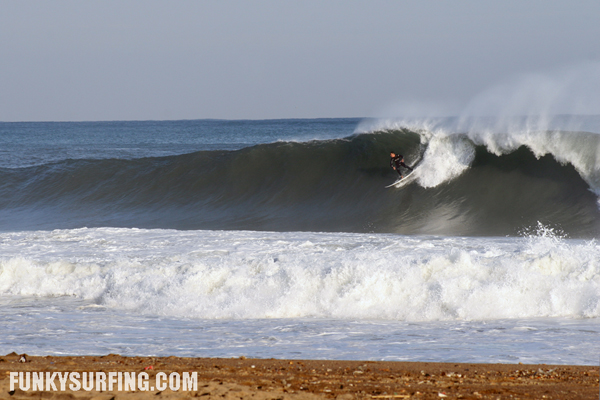The question of where to place Mickey Dora on the long list of surfing’s heroes and villains has long gone unanswered, and since his domination of the golden Malibu shore in the 50’s and 60’s, critics and fans alike have sought to understand and type-cast the enigmatic and controversial figure. Worshipped and loathed in seemingly equal measure, Dora was a zealous and uncompromising character, and aggressively pushed the boundaries of both surfing and social normality. Unpredictable, arrogant, and extraordinary, the “Black Knight of Malibu” dominated the West coast surf scene while railing against the established clean cut American morality and professionalism. The great anti-hero of the surfing world, Mickey Dora dedicated his life to the ultimate free ride, and his refusal to compromise at any level led to both a life of great fame, and even greater torment.
“If you took James Dean’s cool, Muhammad Ali’s poetics, Harry Houdini’s slipperiness, James Bond’s jet-setting, George Carlin’s irony and Kwai Chang Caine’s Zen, and rolled them into one man with a longboard under his arm, you’d come up with something like Miki Dora, surfing’s mythical antihero, otherwise known as the Black Knight of Malibu…” (Brisick, Requiem for Surfing’s Black Knight: The sanctioned Miki Dora, 2006)
Known for dawn surf checks dressed in a black Nazi trench coat or tennis whites, Dora’s attitude virtually screamed anti- establishment
1950’s Malibu played home to a young Mickey Dora, and he quickly set about making an impression. Known for dawn surf checks dressed in a black Nazi trench coat or tennis whites, Dora’s attitude virtually screamed anti- establishment. His entire focus was dedicated towards his surfing, and every minute detail which could improve this was taken into consideration. Little outside of the water could capture his attention, and common place daily chores and routines were of no interest to the champion of Malibu. Dora held several transient jobs, before dedicating his life to the pursuit of a better wave than the last. While as an intelligent character, Dora held interests in fine foods, wine, and academic pursuits such as the study of history and power, his true passion in life was undoubtedly surfing. For several years Dora took handouts from friends and admirers, usually in the form of free board and food. His surfing quickly progressed from good to great, and before long Dora’s style was simply phenomenal, showcasing a progressive ability and style rarely seen. With each session Dora would experience an increased love for the water and the purist surfing ideals of Malibu, and a simultaneous growing loathing of the commercialism which threatened his surf nirvana.

Miki during the 1959 filming of Gidget named as ‘being the single main influence to bring surfing and the surfing subculture into the American mainstream’
Dora charged the Malibu shore day in, day out, building a little more speed on the drop, a little more snap in his turns, a sharper line on a cutback
Dora quickly became an iconic figure in Malibu. By persuading shapers to supply him with a never ending stream of new boards, he had access to the best tools and near unlimited surf time. His fame grew so large that young grom’s would even pay him to ride their own boards for an hour, though the jury is out on whether this was his idea, or theirs. Dora charged the Malibu shore day in, day out, building a little more speed on the drop, a little more snap in his turns, a sharper line on a cutback. A self-confessed “4 and half foot and under man”, Mickey lived, what would be for most of us reading this, the dream. By making constant adjustments to his style, Mickey set himself apart from the rest of Malibu line up. Bobbing and weaving to his own rhythm, Mickey was coined “Da cat” by Surf Guide Magazine for his lightness of tread, and the elegant lines he cut across the face of the wave. Few could match his style in the water, and the glassy California point surf matched his stance perfectly.
However, as with all controversial and mould-breaking characters, Dora had his reported detractions.
“Dora, dubbed the king of Malibu, was infamous for painting a swastika on his surfboard. The guy was a fantastic surfer, but he was a bigot. He was charismatic and a lot of people loved him. But you have to call him out when he’s just spouting garbage.” (ref)
Dora was aware of his position as one of the more experienced and better surfers in the Malibu line up, and utilised this to make statements concerning the increasing commercialism of surfing. At a local Malibu surf content, Dora dropped his trunks to the judging panel to highlight his derision for the contest system. Dora also arrived at surf sessions with a luminous board coated in multi-coloured wax. When asked what he had used to colour the board, he replied pityingly “crayon”. He became known as “the angry young man of surfing”, lamenting the loss of his West coast paradise.
































 Click here to sign up to our newsletter
Click here to sign up to our newsletter
No Comments